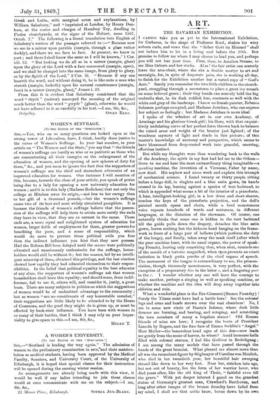WOMEN'S SUFFRAGE.
[TO THE EDITOR OF THE "SPECTATOR."]
S112,—You, who on so many questions are looked upon as the strong tower of Liberalism, have, think, hardly done justice to the cause of Women's Suffrage. In your last number, in your article on " The Women and the State," you say that " the friends of women's suffrage are hardly so wise or so patriotic as those who are concentrating all their energies on the enlargement of the education of women, and the opening of new spheres of duty for them," &c., and you seem to ignore the fact that the supporters of women's suffrage are the chief and staunchest advocates of an improved education for women. One instance I will mention of this, because, towards the close of your article, you speak of praise being due to a lady for opening a new university education for women ; and it is to this lady (Madame Bodichon) that not only the college at Hitchen owes its origin,—not less to her energy than to her gift of a thousand pounds,—but the women's suffrage cause two of its best and most widely circulated pamphlets. It is because the friends of women's suffrage believe that the posses- sion of the suffrage will help them to attain more surely the ends they have in view, that they are so earnest in the cause. These ends are, a more equal and enlightened system of education for women, larger fields of employment for them, greater powers for benefiting the poor, and a sense of responsibility, which would do more to prevent those political evils you fear than the indirect influence you hint that they now possess. Had the Reform Bill been delayed until the masses were politically educated and unanimously enthusiastic for the suffrage, house- holders would still be without it; but the masses, led by an intelli- gent minority of them, obtained this privilege, and the last election showed how rapidly they had educated themselves to their respon- sibilities. In the belief that political equality is the beat educator of any class, the supporters of women's suffrage ask that women householders shall have this equality; and should some, from indif- ference, fail to use it, others will, and consider it, justly, a great boon. There are many subjects in politics on which the suggestions of women would be of undoubted advantage to the community ; but as women " are no constituents of any honourable member," their suggestions are little likely to be attended to by the House of Commons, and the good they might do is given up, or must be effected by back-stair influence. You have been with women in so many of their battles, that I think I may rely on your impar- tiality to give space to this.—I am, Sir, &c., HELEN T.






























 Previous page
Previous page